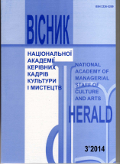МЕТОДОЛОГІЧНІ ЗАСАДИ ОСМИСЛЕННЯ ЛЮДИНИ У ВИМІРАХ ІСТОРИКО-КУЛЬТУРОЛОГІЧНОГО ДОСЛІДЖЕННЯ
DOI:
https://doi.org/10.32461/2226-3209.3.2014.138102Ключові слова:
феномен людини, культурні цінності, історико-культурологічне дослідження, міждисциплінарний підхід, факт культури, аксіологічний підхідАнотація
У статті на основі міждисциплінарного підходу та шляхом залучення методологічних стратегій філософського та історичного наукового знання обґрунтовано методологічні засади осмислення феномена людини в історико-культурологічному дослідженні.
##submission.downloads##
Опубліковано
Номер
Розділ
Ліцензія
Автори, які публікуються у цьому журналі, погоджуються з наступними умовами:
1. Автори залишають за собою право на авторство своєї роботи та передають журналу право першої публікації цієї роботи на умовах ліцензії Creative Commons Attribution License International CC-BY, котра дозволяє іншим особам вільно розповсюджувати опубліковану роботу з обов'язковим посиланням на авторів оригінальної роботи та першу публікацію роботи у цьому журналі.
2. Автори мають право укладати самостійні додаткові угоди щодо неексклюзивного розповсюдження роботи у тому вигляді, в якому вона була опублікована цим журналом (наприклад, розміщувати роботу в електронному сховищі установи або публікувати у складі монографії), за умови збереження посилання на першу публікацію роботи у цьому журналі.
3.Політика журналу дозволяє і заохочує розміщення авторами в мережі Інтернет (наприклад, у сховищах установ або на особистих веб-сайтах) рукопису роботи, як до подання цього рукопису до редакції, так і під час його редакційного опрацювання, оскільки це сприяє виникненню продуктивної наукової дискусії та позитивно позначається на оперативності та динаміці цитування опублікованої роботи.

